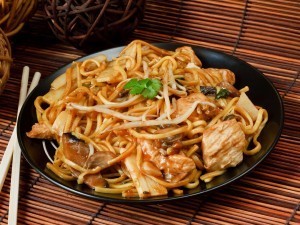 Have you or anyone you know had an adverse reaction to MSG (monosodium glutamate)? MSG is a flavor enhancer that is used in a variety of foods including canned soups, bouillons, chips and other snack foods, salad dressings, frozen dinners and foods served in Chinese and other restaurants. This symptom complex has been called Chinese restaurant syndrome. A substantial minority of people experience an array of symptoms after ingesting MSG including tightness over the scalp, tingling of extremities, flushing, chest pressure, palpitations, thirst, headache, nausea, abdominal discomfort and bladder urgency. Susceptibility to MSG-induced symptoms presumably depends on the efficiency with which a person can metabolize glutamate or clear it out of their bloodstream. Vitamin B6 increase the activity of glutamate dehydrogenase, an enzyme that plays a role in glutamate metabolism. Vitamin B6 deficient rats fed MSG had higher blood levels of glutamate and slower clearance when compared with vitamin B6 sufficient controls. A large proportion of the population has laboratory evidence of marginally low or suboptimal vitamin B6 status. In a double blind trial, 12 people who experienced adverse reactions to MSG and who had laboratory evidence of low vitamin B6 status received 50 mg/day of pyridoxine or placebo for 12 weeks. Of the 9 subjects who received pyridoxine, 8 no longer reacted to MSG. In contrast, all 3 individuals who received placebo continued to react to MSG (p < 0.01).
Have you or anyone you know had an adverse reaction to MSG (monosodium glutamate)? MSG is a flavor enhancer that is used in a variety of foods including canned soups, bouillons, chips and other snack foods, salad dressings, frozen dinners and foods served in Chinese and other restaurants. This symptom complex has been called Chinese restaurant syndrome. A substantial minority of people experience an array of symptoms after ingesting MSG including tightness over the scalp, tingling of extremities, flushing, chest pressure, palpitations, thirst, headache, nausea, abdominal discomfort and bladder urgency. Susceptibility to MSG-induced symptoms presumably depends on the efficiency with which a person can metabolize glutamate or clear it out of their bloodstream. Vitamin B6 increase the activity of glutamate dehydrogenase, an enzyme that plays a role in glutamate metabolism. Vitamin B6 deficient rats fed MSG had higher blood levels of glutamate and slower clearance when compared with vitamin B6 sufficient controls. A large proportion of the population has laboratory evidence of marginally low or suboptimal vitamin B6 status. In a double blind trial, 12 people who experienced adverse reactions to MSG and who had laboratory evidence of low vitamin B6 status received 50 mg/day of pyridoxine or placebo for 12 weeks. Of the 9 subjects who received pyridoxine, 8 no longer reacted to MSG. In contrast, all 3 individuals who received placebo continued to react to MSG (p < 0.01).
In good health,
Lucinda Harms, RPh
